Tutorial Hyperledger Fabric SDK Go: How to build your first app?
This tutorial will introduce you to the Hyperledger Fabric Go SDK and allows you to build a simple application using the blockchain principle.
This tutorial uses Hyperledger Fabric version 1.1.0, on github Heroes-Service use the branch 1.1.0!
This is the first part of this tutorial. The basics SDK features will be shown, but the second part is scheduled to demonstrate a more complex application.
- Prerequisites
- Introduction to Hyperledger Fabric
- Installation guide
- Make your first blockchain network
- Use the Fabric SDK Go
- Make this in a web application
- Referencies
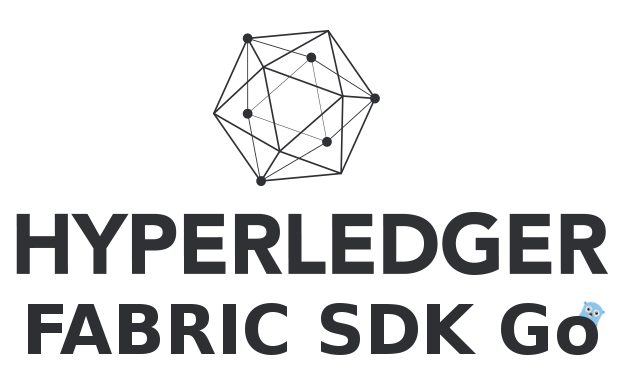
1. Prerequisites
This tutorial won’t explain in detail how Hyperledger Fabric works. I will just give some tips to understand the general behavior of the framework. If you want to get a full explanation of the tool, go to the official documentation there is a lot of work there that explains what kind of blockchain Hyperledger Fabric is.
This tutorial has been made on Ubuntu 16.04 but the Hyperledger Fabric framework is compatible with Mac OS X, Windows and other Linux distributions.
We will use the Go language to design our first application because the Hyperledger Fabric has been also built in Go and the Fabric SDK Go is really simple to use. In addition, the chaincode (smart contract) can be written in Go too. So the full-stack will be only in Go! Awesome right ? However, if you are go phobic, there are other SDK like for NodeJS, Java or Python but we won’t discuss about them here.
Hyperledger Fabric uses Docker to easily deploy a blockchain network. In addition, some components (peers) also deploys docker containers to separate data (channel). So make sure that your platform supports this kind of virtualization.
2. Introduction to Hyperledger Fabric
Hyperledger Fabric is a platform for distributed ledger solutions underpinned by a modular architecture delivering high degrees of confidentiality, resiliency, flexibility and scalability. It is designed to support pluggable implementations of different components and accommodate the complexity and intricacies that exist across the economic ecosystem.
See the full explaination from the official documentation, in the introduction part: Hyperledger Fabric Blockchain
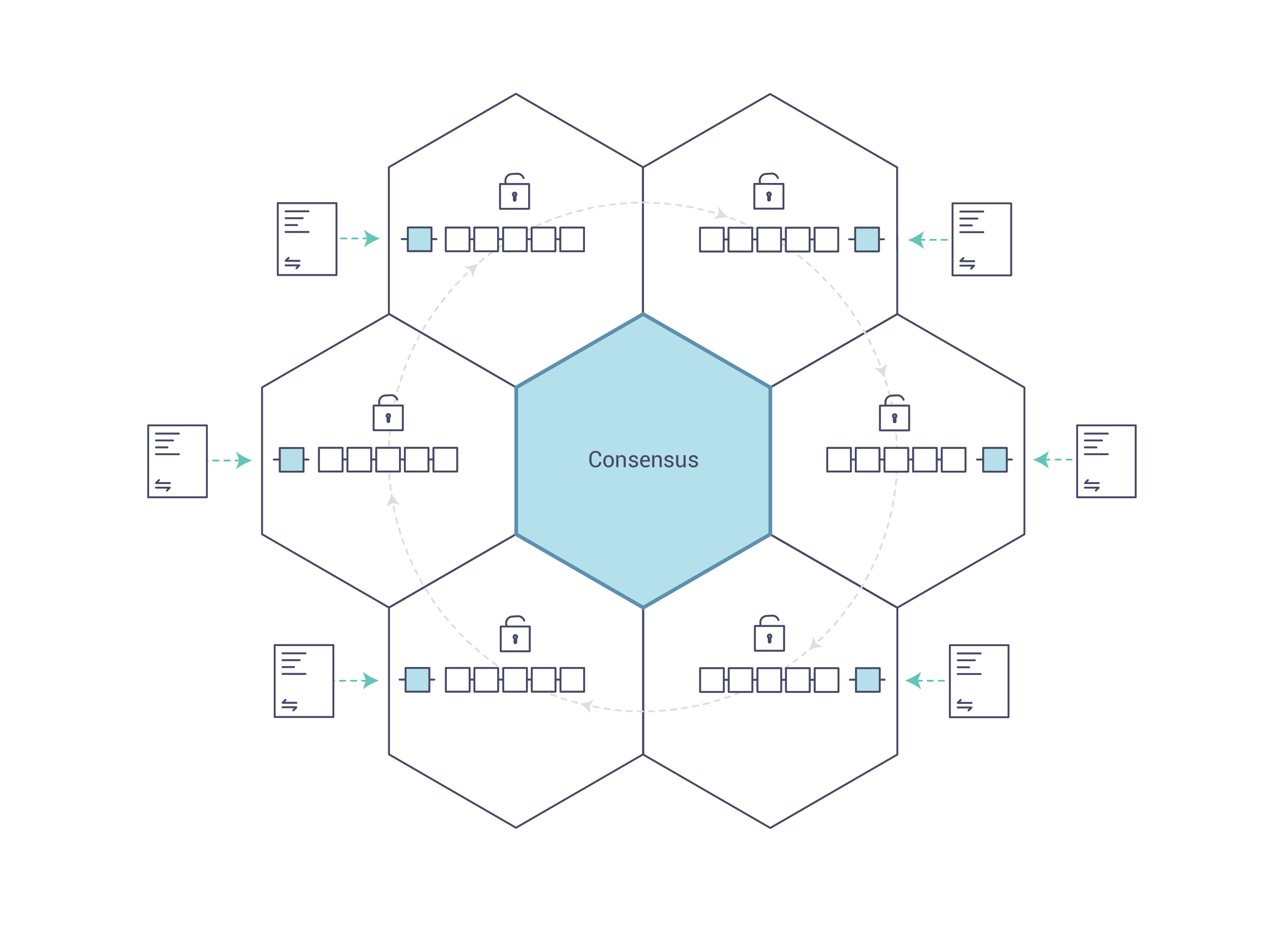
3. Installation guide
This tutorial was made on Ubuntu 16.04, but there is help for Windows, Mac OS X and other Linux distributions users.
a. Docker
Docker version 17.03.0-ce or greater is required.
Linux (Ubuntu)
First of all, in order to install docker correctly we need to install its dependencies:
sudo apt install apt-transport-https ca-certificates curl software-properties-commonOnce the dependencies are installed, we can install docker:
curl -fsSL https://download.docker.com/linux/ubuntu/gpg | sudo apt-key add - && \
sudo add-apt-repository "deb [arch=amd64] https://download.docker.com/linux/ubuntu $(lsb_release -cs) stable" && \
sudo apt update && \
sudo apt install -y docker-ce
Now we need to manage the current user to avoid using administration rights (root) access when we will use the docker command. To do so, we need to add the current user to the docker group:
sudo groupadd docker ; \
sudo gpasswd -a ${USER} docker && \
sudo service docker restartDo not mind if groupadd: group 'docker' already exists error pop up.
To apply the changes made, you need to logout/login. You can then check your version with:
docker -v
Mac OS X
Download and install the latest Docker.dmg package for Mac OS X available on the Docker website. This will install docker-compose as well, so you can skip the next step.
Linux (not Ubuntu)
See links below:
Windows
See instructions from the Docker website: docker.com/docker-for-windows
b. Docker Compose
Docker-compose version 1.8 or greater is required.
We are currently unable to manage easily multiple containers at once. To solve this issue, we need docker-compose.
Linux
The installation is pretty fast:
sudo curl -L https://github.com/docker/compose/releases/download/1.21.2/docker-compose-$(uname -s)-$(uname -m) -o
/usr/local/bin/docker-compose && \
sudo chmod +x /usr/local/bin/docker-composeApply these changes by logout/login and then check its version with:
docker-compose version
Windows / Others
See instructions from the Docker-compose website: docs.docker.com/compose/install
c. Go
Go version 1.9.x or greater is required.
Linux
You can either follow instructions from golang.org or use these generics commands that will install Golang 1.9.2 and prepare your environment (generate your GOPATH) for Ubuntu:
wget https://storage.googleapis.com/golang/go1.9.2.linux-amd64.tar.gz && \
sudo tar -C /usr/local -xzf go1.9.2.linux-amd64.tar.gz && \
rm go1.9.2.linux-amd64.tar.gz && \
echo 'export PATH=$PATH:/usr/local/go/bin' | sudo tee -a /etc/profile && \
echo 'export GOPATH=$HOME/go' | tee -a $HOME/.bashrc && \
echo 'export PATH=$PATH:$GOROOT/bin:$GOPATH/bin' | tee -a $HOME/.bashrc && \
mkdir -p $HOME/go/{src,pkg,bin}To make sure that the installation works, you can logout/login (again) and run:
go version
Windows / Mac OS X / Others
See instructions from the Golang website: golang.org/install
4. Make your first blockchain network
a. Prepare environment
In order to make a blockchain network, we will use docker to build virtual computers that will handle different roles. In this tutorial we will stay as simple as possible. Hyperledger Fabric needs a lot of certificates to ensure encryption during the whole end to end process (TSL, authentications, signing blocks…). The creation of these files requires a little time and in order to go straight to the heart of the matter, we have already prepared all this for you in the folder fixtures in this repository.
Make a new directory in the src folder of your GOPATH, following our repository naming:
mkdir -p $GOPATH/src/github.com/chainHero/heroes-service && \
cd $GOPATH/src/github.com/chainHero/heroes-service
To get the fixtures folder, you can either follow this command line, which will install and use subversion to get the folder from this repository. Or download the zip file from Github and extract only the fixtures folder.
sudo apt install -y subversion && \
cd $GOPATH/src/github.com/chainHero/heroes-service && \
svn checkout https://github.com/chainHero/heroes-service/branches/v1.1.0/fixtures &&
rm -rf fixtures/.svnAlternatively, if you want to know how to build this fixture folder and learn how to create the blockchain network, follow this quick tutorial on how to build your first network.
b. Test
In order to check if the network works, we will use docker-compose to start or stop all containers at the same time. Go inside the fixtures folder, and run:
cd $GOPATH/src/github.com/chainHero/heroes-service/fixtures && \
docker-compose upYou will see a lot of logs with different colors (for your information, red isn’t equal to errors).
Open a new terminal and run:
docker ps
You will see : two peers, the orderer and one CA containers. You have successfully made a new network ready to use with the SDK. To stop the network go back to the previous terminal, press Ctrl+C and wait that all containers are stopped. If you want to explore more deeper, follow our tutorial dedicated to the network part here or check out the official documentation about this: Building Your First Network
Tips: when the network is stopped, all containers used remain accessible. This is very useful to check logs for example. You can see them with docker ps -a. In order to clean up these containers, you need to delete them with docker rm $(docker ps -aq) or if you have used a docker-compose file, go where this file is and run docker-compose down
Tips: you can run the docker-compose command in background to keep the prompt. To do so, use the parameter -d, like this: docker-compose up -d. To stop containers, run in the same folder where the docker-compose.yaml is, the command: docker-compose stop (or docker-compose down to clean up after all containers are stopped).
5. Use the Fabric SDK Go
a. Configuration
Our application needs a lot of parameters, especially the addresses of the Fabric’s components to communicate. We will put everything in a new configuration file, the Fabric SDK Go configuration and our custom parameters. For the moment, we will only try to make the Fabric SDK Go works with the default chaincode:
cd $GOPATH/src/github.com/chainHero/heroes-service && \
vi config.yamlname: "heroes-service-network"
#
# Schema version of the content. Used by the SDK to apply the corresponding parsing rules.
#
version: 1.0.0
#
# The client section used by GO SDK.
#
client:
# Which organization does this application instance belong to? The value must be the name of an org
# defined under "organizations"
organization: org1
logging:
level: info
# Global configuration for peer, event service and orderer timeouts
# if this this section is omitted, then default values will be used (same values as below)
# peer:
# timeout:
# connection: 10s
# response: 180s
# discovery:
# # Expiry period for discovery service greylist filter
# # The channel client will greylist peers that are found to be offline
# # to prevent re-selecting them in subsequent retries.
# # This interval will define how long a peer is greylisted
# greylistExpiry: 10s
# eventService:
# # Event service type (optional). If not specified then the type is automatically
# # determined from channel capabilities.
# type: (deliver|eventhub)
# the below timeouts are commented out to use the default values that are found in
# "pkg/fab/endpointconfig.go"
# the client is free to override the default values by uncommenting and resetting
# the values as they see fit in their config file
# timeout:
# connection: 15s
# registrationResponse: 15s
# orderer:
# timeout:
# connection: 15s
# response: 15s
# global:
# timeout:
# query: 180s
# execute: 180s
# resmgmt: 180s
# cache:
# connectionIdle: 30s
# eventServiceIdle: 2m
# channelConfig: 30m
# channelMembership: 30s
# discovery: 10s
# selection: 10m
# Root of the MSP directories with keys and certs.
cryptoconfig:
path: ${GOPATH}/src/github.com/chainHero/heroes-service/fixtures/crypto-config
# Some SDKs support pluggable KV stores, the properties under "credentialStore"
# are implementation specific
credentialStore:
path: /tmp/heroes-service-store
# [Optional]. Specific to the CryptoSuite implementation used by GO SDK. Software-based implementations
# requiring a key store. PKCS#11 based implementations does not.
cryptoStore:
path: /tmp/heroes-service-msp
# BCCSP config for the client. Used by GO SDK.
BCCSP:
security:
enabled: true
default:
provider: "SW"
hashAlgorithm: "SHA2"
softVerify: true
level: 256
tlsCerts:
# [Optional]. Use system certificate pool when connecting to peers, orderers (for negotiating TLS) Default: false
systemCertPool: false
# [Optional]. Client key and cert for TLS handshake with peers and orderers
client:
keyfile:
certfile:
#
# [Optional]. But most apps would have this section so that channel objects can be constructed
# based on the content below. If an app is creating channels, then it likely will not need this
# section.
#
channels:
# name of the channel
chainhero:
# Required. list of orderers designated by the application to use for transactions on this
# channel. This list can be a result of access control ("org1" can only access "ordererA"), or
# operational decisions to share loads from applications among the orderers. The values must
# be "names" of orgs defined under "organizations/peers"
# deprecated: not recommended, to override any orderer configuration items, entity matchers should be used.
# orderers:
# - orderer.example.com
# Required. list of peers from participating orgs
peers:
peer0.org1.hf.chainhero.io:
# [Optional]. will this peer be sent transaction proposals for endorsement? The peer must
# have the chaincode installed. The app can also use this property to decide which peers
# to send the chaincode install request. Default: true
endorsingPeer: true
# [Optional]. will this peer be sent query proposals? The peer must have the chaincode
# installed. The app can also use this property to decide which peers to send the
# chaincode install request. Default: true
chaincodeQuery: true
# [Optional]. will this peer be sent query proposals that do not require chaincodes, like
# queryBlock(), queryTransaction(), etc. Default: true
ledgerQuery: true
# [Optional]. will this peer be the target of the SDK's listener registration? All peers can
# produce events but the app typically only needs to connect to one to listen to events.
# Default: true
eventSource: true
peer1.org1.hf.chainhero.io:
policies:
#[Optional] options for retrieving channel configuration blocks
queryChannelConfig:
#[Optional] min number of success responses (from targets/peers)
minResponses: 1
#[Optional] channel config will be retrieved for these number of random targets
maxTargets: 1
#[Optional] retry options for query config block
retryOpts:
#[Optional] number of retry attempts
attempts: 5
#[Optional] the back off interval for the first retry attempt
initialBackoff: 500ms
#[Optional] the maximum back off interval for any retry attempt
maxBackoff: 5s
#[Optional] he factor by which the initial back off period is exponentially incremented
backoffFactor: 2.0
#
# list of participating organizations in this network
#
organizations:
org1:
mspid: org1.hf.chainhero.io
cryptoPath: peerOrganizations/org1.hf.chainhero.io/users/{userName}@org1.hf.chainhero.io/msp
peers:
- peer0.org1.hf.chainhero.io
- peer1.org1.hf.chainhero.io
# [Optional]. Certificate Authorities issue certificates for identification purposes in a Fabric based
# network. Typically certificates provisioning is done in a separate process outside of the
# runtime network. Fabric-CA is a special certificate authority that provides a REST APIs for
# dynamic certificate management (enroll, revoke, re-enroll). The following section is only for
# Fabric-CA servers.
certificateAuthorities:
- ca.org1.hf.chainhero.io
#
# List of orderers to send transaction and channel create/update requests to. For the time
# being only one orderer is needed. If more than one is defined, which one get used by the
# SDK is implementation specific. Consult each SDK's documentation for its handling of orderers.
#
orderers:
orderer.hf.chainhero.io:
url: localhost:7050
# these are standard properties defined by the gRPC library
# they will be passed in as-is to gRPC client constructor
grpcOptions:
ssl-target-name-override: orderer.hf.chainhero.io
# These parameters should be set in coordination with the keepalive policy on the server,
# as incompatible settings can result in closing of connection.
# When duration of the 'keep-alive-time' is set to 0 or less the keep alive client parameters are disabled
keep-alive-time: 0s
keep-alive-timeout: 20s
keep-alive-permit: false
fail-fast: false
# allow-insecure will be taken into consideration if address has no protocol defined, if true then grpc or else grpcs
allow-insecure: false
tlsCACerts:
# Certificate location absolute path
path: ${GOPATH}/src/github.com/chainHero/heroes-service/fixtures/crypto-config/ordererOrganizations/hf.chainhero.io/tlsca/tlsca.hf.chainhero.io-cert.pem
#
# List of peers to send various requests to, including endorsement, query
# and event listener registration.
#
peers:
peer0.org1.hf.chainhero.io:
# this URL is used to send endorsement and query requests
url: localhost:7051
# eventUrl is only needed when using eventhub (default is delivery service)
eventUrl: localhost:7053
grpcOptions:
ssl-target-name-override: peer0.org1.hf.chainhero.io
# These parameters should be set in coordination with the keepalive policy on the server,
# as incompatible settings can result in closing of connection.
# When duration of the 'keep-alive-time' is set to 0 or less the keep alive client parameters are disabled
keep-alive-time: 0s
keep-alive-timeout: 20s
keep-alive-permit: false
fail-fast: false
# allow-insecure will be taken into consideration if address has no protocol defined, if true then grpc or else grpcs
allow-insecure: false
tlsCACerts:
# Certificate location absolute path
path: ${GOPATH}/src/github.com/chainHero/heroes-service/fixtures/crypto-config/peerOrganizations/org1.hf.chainhero.io/tlsca/tlsca.org1.hf.chainhero.io-cert.pem
peer1.org1.hf.chainhero.io:
# this URL is used to send endorsement and query requests
url: localhost:8051
# eventUrl is only needed when using eventhub (default is delivery service)
eventUrl: localhost:8053
grpcOptions:
ssl-target-name-override: peer1.org1.hf.chainhero.io
# These parameters should be set in coordination with the keepalive policy on the server,
# as incompatible settings can result in closing of connection.
# When duration of the 'keep-alive-time' is set to 0 or less the keep alive client parameters are disabled
keep-alive-time: 0s
keep-alive-timeout: 20s
keep-alive-permit: false
fail-fast: false
# allow-insecure will be taken into consideration if address has no protocol defined, if true then grpc or else grpcs
allow-insecure: false
tlsCACerts:
# Certificate location absolute path
path: ${GOPATH}/src/github.com/chainHero/heroes-service/fixtures/crypto-config/peerOrganizations/org1.hf.chainhero.io/tlsca/tlsca.org1.hf.chainhero.io-cert.pem
#
# Fabric-CA is a special kind of Certificate Authority provided by Hyperledger Fabric which allows
# certificate management to be done via REST APIs. Application may choose to use a standard
# Certificate Authority instead of Fabric-CA, in which case this section would not be specified.
#
certificateAuthorities:
ca.org1.hf.chainhero.io:
url: http://localhost:7054
# Fabric-CA supports dynamic user enrollment via REST APIs. A "root" user, a.k.a registrar, is
# needed to enroll and invoke new users.
httpOptions:
verify: false
registrar:
enrollId: admin
enrollSecret: adminpw
# [Optional] The optional name of the CA.
caName: ca.org1.hf.chainhero.io
tlsCACerts:
# Certificate location absolute path
path: ${GOPATH}/src/github.com/chainHero/heroes-service/fixtures/crypto-config/peerOrganizations/org1.hf.chainhero.io/ca/ca.org1.hf.chainhero.io-cert.pem
entityMatchers:
peer:
- pattern: (\w*)peer0.org1.hf.chainhero.io(\w*)
urlSubstitutionExp: localhost:7051
eventUrlSubstitutionExp: localhost:7053
sslTargetOverrideUrlSubstitutionExp: peer0.org1.hf.chainhero.io
mappedHost: peer0.org1.hf.chainhero.io
- pattern: (\w*)peer1.org1.hf.chainhero.io(\w*)
urlSubstitutionExp: localhost:8051
eventUrlSubstitutionExp: localhost:8053
sslTargetOverrideUrlSubstitutionExp: peer1.org1.hf.chainhero.io
mappedHost: peer1.org1.hf.chainhero.io
orderer:
- pattern: (\w*)orderer.hf.chainhero.io(\w*)
urlSubstitutionExp: localhost:7050
sslTargetOverrideUrlSubstitutionExp: orderer.hf.chainhero.io
mappedHost: orderer.hf.chainhero.io
certificateAuthorities:
- pattern: (\w*)ca.org1.hf.chainhero.io(\w*)
urlSubstitutionExp: http://localhost:7054
mappedHost: ca.org1.hf.chainhero.io
The configuration file is also available here: config.yaml
b. Initialise
We add a new folder named blockchain that will contain the whole interface that communicate with the network. We will see the Fabric SDK Go only in this folder.
mkdir $GOPATH/src/github.com/chainHero/heroes-service/blockchain
Now, we add a new go file named setup.go:
vi $GOPATH/src/github.com/chainHero/heroes-service/blockchain/setup.gopackage blockchain
import (
"fmt"
mspclient "github.com/hyperledger/fabric-sdk-go/pkg/client/msp"
"github.com/hyperledger/fabric-sdk-go/pkg/client/resmgmt"
"github.com/hyperledger/fabric-sdk-go/pkg/common/errors/retry"
"github.com/hyperledger/fabric-sdk-go/pkg/common/providers/msp"
"github.com/hyperledger/fabric-sdk-go/pkg/core/config"
"github.com/hyperledger/fabric-sdk-go/pkg/fabsdk"
"github.com/pkg/errors"
)
// FabricSetup implementation
type FabricSetup struct {
ConfigFile string
OrgID string
OrdererID string
ChannelID string
ChainCodeID string
initialized bool
ChannelConfig string
ChaincodeGoPath string
ChaincodePath string
OrgAdmin string
OrgName string
UserName string
admin *resmgmt.Client
sdk *fabsdk.FabricSDK
}
// Initialize reads the configuration file and sets up the client, chain and event hub
func (setup *FabricSetup) Initialize() error {
// Add parameters for the initialization
if setup.initialized {
return errors.New("sdk already initialized")
}
// Initialize the SDK with the configuration file
sdk, err := fabsdk.New(config.FromFile(setup.ConfigFile))
if err != nil {
return errors.WithMessage(err, "failed to create SDK")
}
setup.sdk = sdk
fmt.Println("SDK created")
// The resource management client is responsible for managing channels (create/update channel)
resourceManagerClientContext := setup.sdk.Context(fabsdk.WithUser(setup.OrgAdmin), fabsdk.WithOrg(setup.OrgName))
if err != nil {
return errors.WithMessage(err, "failed to load Admin identity")
}
resMgmtClient, err := resmgmt.New(resourceManagerClientContext)
if err != nil {
return errors.WithMessage(err, "failed to create channel management client from Admin identity")
}
setup.admin = resMgmtClient
fmt.Println("Ressource management client created")
// The MSP client allow us to retrieve user information from their identity, like its signing identity which we will need to save the channel
mspClient, err := mspclient.New(sdk.Context(), mspclient.WithOrg(setup.OrgName))
if err != nil {
return errors.WithMessage(err, "failed to create MSP client")
}
adminIdentity, err := mspClient.GetSigningIdentity(setup.OrgAdmin)
if err != nil {
return errors.WithMessage(err, "failed to get admin signing identity")
}
req := resmgmt.SaveChannelRequest{ChannelID: setup.ChannelID, ChannelConfigPath: setup.ChannelConfig, SigningIdentities: []msp.SigningIdentity{adminIdentity}}
txID, err := setup.admin.SaveChannel(req, resmgmt.WithOrdererEndpoint(setup.OrdererID))
if err != nil || txID.TransactionID == "" {
return errors.WithMessage(err, "failed to save channel")
}
fmt.Println("Channel created")
// Make admin user join the previously created channel
if err = setup.admin.JoinChannel(setup.ChannelID, resmgmt.WithRetry(retry.DefaultResMgmtOpts), resmgmt.WithOrdererEndpoint(setup.OrdererID)); err != nil {
return errors.WithMessage(err, "failed to make admin join channel")
}
fmt.Println("Channel joined")
fmt.Println("Initialization Successful")
setup.initialized = true
return nil
}
func (setup *FabricSetup) CloseSDK() {
setup.sdk.Close()
}The file is available here: blockchain/setup.go
At this stage, we only initialized a client that will communicate to a peer, a CA and an orderer. We also made a new channel and connected this peer to this channel. See the comments in the code for more information.
c. Test
To make sure that the client managed to initialize all his components, we will make a simple test with the network launched. In order to do this, we need to build the go code. Since we haven’t any main file we have to add one:
cd $GOPATH/src/github.com/chainHero/heroes-service && \
vi main.gopackage main
import (
"fmt"
"github.com/chainHero/heroes-service/blockchain"
"os"
)
func main() {
// Definition of the Fabric SDK properties
fSetup := blockchain.FabricSetup{
// Network parameters
OrdererID: "orderer.hf.chainhero.io",
// Channel parameters
ChannelID: "chainhero",
ChannelConfig: os.Getenv("GOPATH") + "/src/github.com/chainHero/heroes-service/fixtures/artifacts/chainhero.channel.tx",
// Chaincode parameters
ChainCodeID: "heroes-service",
ChaincodeGoPath: os.Getenv("GOPATH"),
ChaincodePath: "github.com/chainHero/heroes-service/chaincode/",
OrgAdmin: "Admin",
OrgName: "org1",
ConfigFile: "config.yaml",
// User parameters
UserName: "User1",
}
// Initialization of the Fabric SDK from the previously set properties
err := fSetup.Initialize()
if err != nil {
fmt.Printf("Unable to initialize the Fabric SDK: %v\n", err)
return
}
// Close SDK
defer fSetup.CloseSDK()
}The file is available here: main.go
As you can see, we fixed the GOPATH of the environment if it’s not set. We will need this feature in order to compile the chaincode (we will see this in the next step).
The last thing to do, before starting the compilation, is to use a vendor directory that will contain all our dependencies. In our GOPATH we have Fabric SDK Go and maybe other projects. When we will try to compile our app, Golang search dependencies in our GOPATH, but first it checks if there is a vendor folder in the project. If the dependency is satisfied, then Golang doesn’t go looking in GOPATH or GOROOT. This is very useful when using several different versions of a dependency (some conflicts can happen, like multiple definitions of BCCSP in our case). We will handle this by using a tool like dep to flatten these dependencies in the vendor directory.
When you installed the SDK dependencies, DEP was automatically installed. If this is not the case, you can install it by reading the instructions available here: dep installation
Create a file called Gopkg.toml and copy this inside:
cd $GOPATH/src/github.com/chainHero/heroes-service && \
vi Gopkg.tomlignored = ["github.com/chainHero/heroes-service/chaincode"]
[[constraint]]
# Release v1.0.0-alpha4
name = "github.com/hyperledger/fabric-sdk-go"
revision = "a906355f73d060d7bf95874a9e90dc17589edbb3"This is a constraint for dep in order to specify that in our vendor we want the SDK Go to a specific version.
Save the file and then execute this command to synchronize the vendor directory with our project’s dependencies (this may take a while to proceed):
cd $GOPATH/src/github.com/chainHero/heroes-service && \
dep ensureNow we can compile our application:
cd $GOPATH/src/github.com/chainHero/heroes-service && \
go build
After some time, a new binary named main will appear at the root of the project. Try to start the binary like this:
cd $GOPATH/src/github.com/chainHero/heroes-service && \
./heroes-service
At this point, it won’t work because there is no network deployed that the SDK can talk with. We will first start the network and then launch the app again:
cd $GOPATH/src/github.com/chainHero/heroes-service/fixtures && \
docker-compose up -d && \
cd .. && \
./heroes-service
Note: you need to see “Initialization Successful”. If it’s not the case then something went wrong.
Alright! So we just initialised the SDK with our local network. In the next step, we will interact with a chaincode.
d. Clean up and Makefile
The Fabric SDK generates some files, like certificates, binaries and temporally files. Shutting down the network won’t fully clean up your environment and when you will need to start it again, these files will be reused to avoid building process. For development you can keep them to test quickly but for a real test, you need to clean up all and start from the beginning.
How clean up my environment ?
-
Shut down your network:
cd $GOPATH/src/github.com/chainhero-website/heroes-service/fixtures && docker-compose down -
Remove credential stores (defined in the config file, in the
client.credentialStoresection):rm -rf /tmp/heroes-service-* -
Remove some docker containers and docker images not generated by the
docker-composecommand:docker rm -f -v `docker ps -a --no-trunc | grep "heroes-service" | cut -d ' ' -f 1` 2>/dev/null and docker rmi `docker images --no-trunc | grep "heroes-service" | cut -d ' ' -f 1` 2>/dev/null
How to be more efficient ?
We can automatize all these tasks in one single step. Also the build and start process can be automated. To do so, we will create a Makefile. First, ensure that you have the tool:
make --version
If make is not installed do (Ubuntu):
sudo apt install make
Then create a file named Makefile at the root of the project with this content:
cd $GOPATH/src/github.com/chainHero/heroes-service && \
vi Makefile
.PHONY: all dev clean build env-up env-down run
all: clean build env-up run
dev: build run
##### BUILD
build:
@echo "Build ..."
@dep ensure
@go build
@echo "Build done"
##### ENV
env-up:
@echo "Start environment ..."
@cd fixtures && docker-compose up --force-recreate -d
@echo "Environment up"
env-down:
@echo "Stop environment ..."
@cd fixtures && docker-compose down
@echo "Environment down"
##### RUN
run:
@echo "Start app ..."
@./heroes-service
##### CLEAN
clean: env-down
@echo "Clean up ..."
@rm -rf /tmp/heroes-service-* heroes-service
@docker rm -f -v `docker ps -a --no-trunc | grep "heroes-service" | cut -d ' ' -f 1` 2>/dev/null || true
@docker rmi `docker images --no-trunc | grep "heroes-service" | cut -d ' ' -f 1` 2>/dev/null || true
@echo "Clean up done"
The file is available here: Makefile
Now with the task all:
- the whole environment will be cleaned up,
- then our go program will be compiled,
- after which the network will be deployed and
- finally the app will be up and running.
To use it, go in the root of the project and use the make command:
-
Task
all:makeormake all -
Task
clean: clean up everything and put down the network (make clean) -
Task
build: just build the application (make build) -
Task
env-up: just make the network up (make env-up) - ...
e. Install & instantiate the chaincode
We are almost there to use the blockchain system. But for now we haven’t set up any chaincode (smart contract) yet that will handle queries from our application. First, let’s create a new directory named chaincode and add a new file named main.go (this is the main entry point of our smart-contract):
cd $GOPATH/src/github.com/chainHero/heroes-service && \
mkdir chaincode && \
vi chaincode/main.gopackage main
import (
"fmt"
"github.com/hyperledger/fabric/core/chaincode/shim"
pb "github.com/hyperledger/fabric/protos/peer"
)
// HeroesServiceChaincode implementation of Chaincode
type HeroesServiceChaincode struct {
}
// Init of the chaincode
// This function is called only one when the chaincode is instantiated.
// So the goal is to prepare the ledger to handle future requests.
func (t *HeroesServiceChaincode) Init(stub shim.ChaincodeStubInterface) pb.Response {
fmt.Println("########### HeroesServiceChaincode Init ###########")
// Get the function and arguments from the request
function, _ := stub.GetFunctionAndParameters()
// Check if the request is the init function
if function != "init" {
return shim.Error("Unknown function call")
}
// Put in the ledger the key/value hello/world
err := stub.PutState("hello", []byte("world"))
if err != nil {
return shim.Error(err.Error())
}
// Return a successful message
return shim.Success(nil)
}
// Invoke
// All future requests named invoke will arrive here.
func (t *HeroesServiceChaincode) Invoke(stub shim.ChaincodeStubInterface) pb.Response {
fmt.Println("########### HeroesServiceChaincode Invoke ###########")
// Get the function and arguments from the request
function, args := stub.GetFunctionAndParameters()
// Check whether it is an invoke request
if function != "invoke" {
return shim.Error("Unknown function call")
}
// Check whether the number of arguments is sufficient
if len(args) < 1 {
return shim.Error("The number of arguments is insufficient.")
}
// In order to manage multiple type of request, we will check the first argument.
// Here we have one possible argument: query (every query request will read in the ledger without modification)
if args[0] == "query" {
return t.query(stub, args)
}
return shim.Error("Unknown action, check the first argument")
}
// query
// Every readonly functions in the ledger will be here
func (t *HeroesServiceChaincode) query(stub shim.ChaincodeStubInterface, args []string) pb.Response {
fmt.Println("########### HeroesServiceChaincode query ###########")
// Check whether the number of arguments is sufficient
if len(args) < 2 {
return shim.Error("The number of arguments is insufficient.")
}
// Like the Invoke function, we manage multiple type of query requests with the second argument.
// We also have only one possible argument: hello
if args[1] == "hello" {
// Get the state of the value matching the key hello in the ledger
state, err := stub.GetState("hello")
if err != nil {
return shim.Error("Failed to get state of hello")
}
// Return this value in response
return shim.Success(state)
}
// If the arguments given don’t match any function, we return an error
return shim.Error("Unknown query action, check the second argument.")
}
func main() {
// Start the chaincode and make it ready for futures requests
err := shim.Start(new(HeroesServiceChaincode))
if err != nil {
fmt.Printf("Error starting Heroes Service chaincode: %s", err)
}
}The file is available here: chaincode/main.go
Note: the chaincode isn’t really related to the application, we can have one repository for the app and another for the chaincode. For your information, today the chaincode can also be written in other languages like Java.
For now, the chaincode does nothing extraordinary, just put the key/value hello/world in the ledger at initialisation. In addition, there is one function that we can call by an invoke: query hello. This function gets the state of the ledger, i.e. hello and give it in response. We will test this in the next step, after successfully install and instantiate the chaincode.
In order to install and instantiate the chaincode, we need to add some code in the application. Edit the blockchain/setup.go with those following lines:
package blockchain
import (
"fmt"
"github.com/hyperledger/fabric-sdk-go/pkg/client/channel"
"github.com/hyperledger/fabric-sdk-go/pkg/client/event"
mspclient "github.com/hyperledger/fabric-sdk-go/pkg/client/msp"
"github.com/hyperledger/fabric-sdk-go/pkg/client/resmgmt"
"github.com/hyperledger/fabric-sdk-go/pkg/common/errors/retry"
"github.com/hyperledger/fabric-sdk-go/pkg/common/providers/msp"
"github.com/hyperledger/fabric-sdk-go/pkg/core/config"
packager "github.com/hyperledger/fabric-sdk-go/pkg/fab/ccpackager/gopackager"
"github.com/hyperledger/fabric-sdk-go/pkg/fabsdk"
"github.com/hyperledger/fabric-sdk-go/third_party/github.com/hyperledger/fabric/common/cauthdsl"
"github.com/pkg/errors"
)
// FabricSetup implementation
type FabricSetup struct {
ConfigFile string
OrgID string
OrdererID string
ChannelID string
ChainCodeID string
initialized bool
ChannelConfig string
ChaincodeGoPath string
ChaincodePath string
OrgAdmin string
OrgName string
UserName string
client *channel.Client
admin *resmgmt.Client
sdk *fabsdk.FabricSDK
event *event.Client
}
[...]
func (setup *FabricSetup) InstallAndInstantiateCC() error {
// Create the chaincode package that will be sent to the peers
ccPkg, err := packager.NewCCPackage(setup.ChaincodePath, setup.ChaincodeGoPath)
if err != nil {
return errors.WithMessage(err, "failed to create chaincode package")
}
fmt.Println("ccPkg created")
// Install example cc to org peers
installCCReq := resmgmt.InstallCCRequest{Name: setup.ChainCodeID, Path: setup.ChaincodePath, Version: "0", Package: ccPkg}
_, err = setup.admin.InstallCC(installCCReq, resmgmt.WithRetry(retry.DefaultResMgmtOpts))
if err != nil {
return errors.WithMessage(err, "failed to install chaincode")
}
fmt.Println("Chaincode installed")
// Set up chaincode policy
ccPolicy := cauthdsl.SignedByAnyMember([]string{"org1.hf.chainhero.io"})
resp, err := setup.admin.InstantiateCC(setup.ChannelID, resmgmt.InstantiateCCRequest{Name: setup.ChainCodeID, Path: setup.ChaincodeGoPath, Version: "0", Args: [][]byte{[]byte("init")}, Policy: ccPolicy})
if err != nil || resp.TransactionID == "" {
return errors.WithMessage(err, "failed to instantiate the chaincode")
}
fmt.Println("Chaincode instantiated")
// Channel client is used to query and execute transactions
clientContext := setup.sdk.ChannelContext(setup.ChannelID, fabsdk.WithUser(setup.UserName))
setup.client, err = channel.New(clientContext)
if err != nil {
return errors.WithMessage(err, "failed to create new channel client")
}
fmt.Println("Channel client created")
// Creation of the client which will enables access to our channel events
setup.event, err = event.New(clientContext)
if err != nil {
return errors.WithMessage(err, "failed to create new event client")
}
fmt.Println("Event client created")
fmt.Println("Chaincode Installation & Instantiation Successful")
return nil
}
[...]The file is available here: blockchain/setup.go
Tips: take care of the chaincode version, if you want to update your chaincode, increment the version number set at the lines 103 and 113 of this setup.go file. Otherwise the network will keep the same chaincode.
We need now to modify our main.go file in order to call our new function
cd $GOPATH/src/github.com/chainHero/heroes-service && \
vi main.gopackage main
import (
"fmt"
"github.com/chainHero/heroes-service/blockchain"
"os"
)
func main() {
// Definition of the Fabric SDK properties
fSetup := blockchain.FabricSetup{
// Network parameters
OrdererID: "orderer.hf.chainhero.io",
// Channel parameters
ChannelID: "chainhero",
ChannelConfig: os.Getenv("GOPATH") + "/src/github.com/chainHero/heroes-service/fixtures/artifacts/chainhero.channel.tx",
// Chaincode parameters
ChainCodeID: "heroes-service",
ChaincodeGoPath: os.Getenv("GOPATH"),
ChaincodePath: "github.com/chainHero/heroes-service/chaincode/",
OrgAdmin: "Admin",
OrgName: "org1",
ConfigFile: "config.yaml",
// User parameters
UserName: "User1",
}
[...]
// Install and instantiate the chaincode
err = fSetup.InstallAndInstantiateCC()
if err != nil {
fmt.Printf("Unable to install and instantiate the chaincode: %v\n", err)
return
}
}The file is available here: main.go
We can test this, just with the make command setup in the previous step:
cd $GOPATH/src/github.com/chainHero/heroes-service && \
make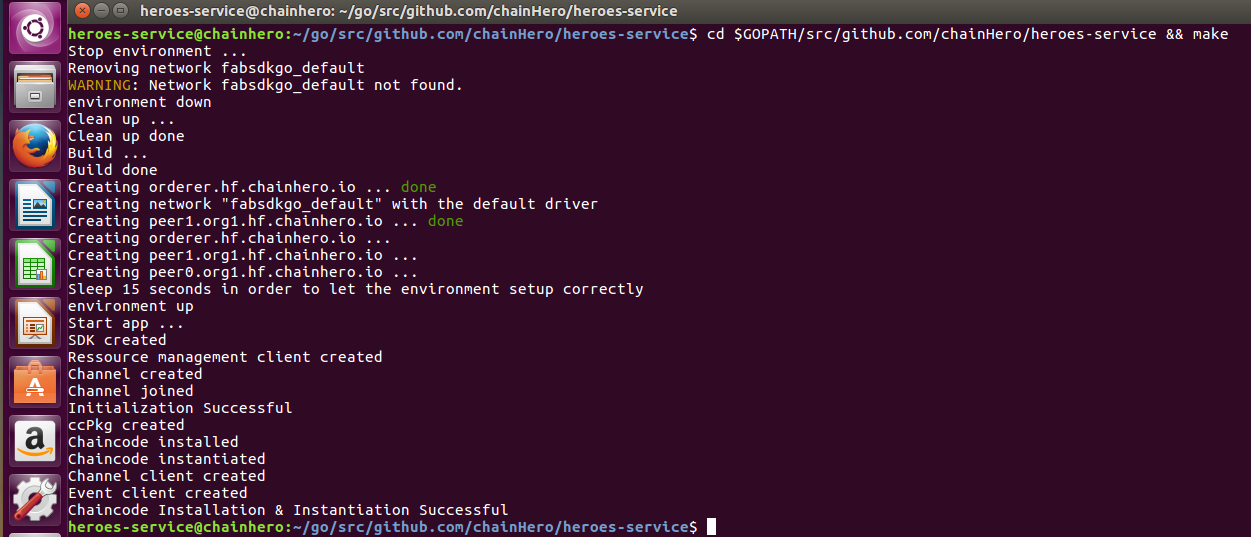
Tips: the installation and the instantiation don’t need to be run at every start of the application. Only when we update the chaincode (and the chaincode version). A solution is to provide an argument when we run the application to tell to do this additional procedure before move on. Since in this tutorial we will clean up the environment every time we don’t really care about that.
f. Query the chaincode
Like a database, the chaincode is plugged and ready to answer. Let’s try the hello query.
We will put all query functions in a new file named query.go in the blockchain folder:
cd $GOPATH/src/github.com/chainHero/heroes-service && \
vi blockchain/query.gopackage blockchain
import (
"fmt"
"github.com/hyperledger/fabric-sdk-go/pkg/client/channel"
)
// QueryHello query the chaincode to get the state of hello
func (setup *FabricSetup) QueryHello() (string, error) {
// Prepare arguments
var args []string
args = append(args, "invoke")
args = append(args, "query")
args = append(args, "hello")
response, err := setup.client.Query(channel.Request{ChaincodeID: setup.ChainCodeID, Fcn: args[0], Args: [][]byte{[]byte(args[1]), []byte(args[2])}})
if err != nil {
return "", fmt.Errorf("failed to query: %v", err)
}
return string(response.Payload), nil
}The file is available here: blockchain/query.go
You can add the call to this new function in the main.go:
cd $GOPATH/src/github.com/chainHero/heroes-service && \
vi main.gofunc main() {
[...]
// Query the chaincode
response, err := fSetup.QueryHello()
if err != nil {
fmt.Printf("Unable to query hello on the chaincode: %v\n", err)
} else {
fmt.Printf("Response from the query hello: %s\n", response)
}
}The file is available here: main.go
Let’s try:
cd $GOPATH/src/github.com/chainHero/heroes-service && \
make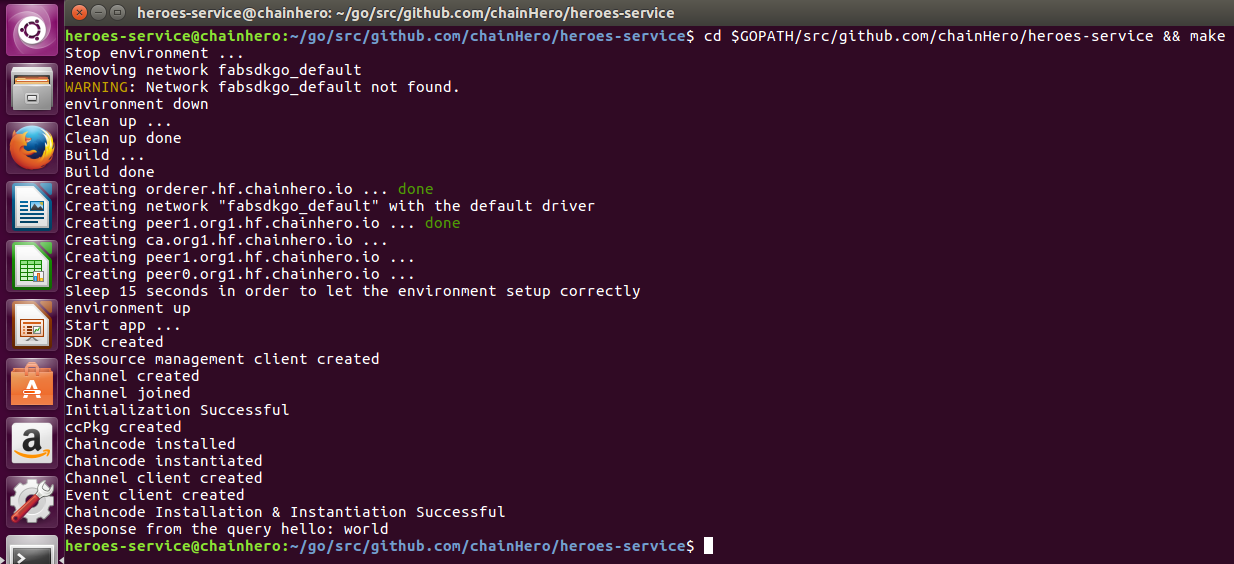
g. Change the ledger state
The next thing to do in order to make a basic tour of the Fabric SDK Go, is to make a request to the chaincode in order to change the ledger state.
First, we will add this ability in the chaincode. Edit the chaincode/main.go file:
[...]
// Invoke
// All future requests named invoke will arrive here.
func (t *HeroesServiceChaincode) Invoke(stub shim.ChaincodeStubInterface) pb.Response {
fmt.Println("########### HeroesServiceChaincode Invoke ###########")
// Get the function and arguments from the request
function, args := stub.GetFunctionAndParameters()
// Check whether it is an invoke request
if function != "invoke" {
return shim.Error("Unknown function call")
}
// Check whether the number of arguments is sufficient
if len(args) < 1 {
return shim.Error("The number of arguments is insufficient.")
}
// In order to manage multiple type of request, we will check the first argument.
// Here we have one possible argument: query (every query request will read in the ledger without modification)
if args[0] == "query" {
return t.query(stub, args)
}
// The update argument will manage all update in the ledger
if args[0] == "invoke" {
return t.invoke(stub, args)
}
// If the arguments given don’t match any function, we return an error
return shim.Error("Unknown action, check the first argument")
}
[...]
// invoke
// Every functions that read and write in the ledger will be here
func (t *HeroesServiceChaincode) invoke(stub shim.ChaincodeStubInterface, args []string) pb.Response {
fmt.Println("########### HeroesServiceChaincode invoke ###########")
if len(args) < 2 {
return shim.Error("The number of arguments is insufficient.")
}
// Check if the ledger key is "hello" and process if it is the case. Otherwise it returns an error.
if args[1] == "hello" && len(args) == 3 {
// Write the new value in the ledger
err := stub.PutState("hello", []byte(args[2]))
if err != nil {
return shim.Error("Failed to update state of hello")
}
// Notify listeners that an event "eventInvoke" have been executed (check line 19 in the file invoke.go)
err = stub.SetEvent("eventInvoke", []byte{})
if err != nil {
return shim.Error(err.Error())
}
// Return this value in response
return shim.Success(nil)
}
// If the arguments given don’t match any function, we return an error
return shim.Error("Unknown invoke action, check the second argument.")
}
[...]The file is available here: chaincode/main.go
From the application side, we add a new function to make the invocation of the chaincode. Add a file named invoke.go in the blockchain folder:
cd $GOPATH/src/github.com/chainHero/heroes-service && \
vi blockchain/invoke.gopackage blockchain
import (
"fmt"
"github.com/hyperledger/fabric-sdk-go/pkg/client/channel"
"time"
)
// InvokeHello
func (setup *FabricSetup) InvokeHello(value string) (string, error) {
// Prepare arguments
var args []string
args = append(args, "invoke")
args = append(args, "invoke")
args = append(args, "hello")
args = append(args, value)
eventID := "eventInvoke"
// Add data that will be visible in the proposal, like a description of the invoke request
transientDataMap := make(map[string][]byte)
transientDataMap["result"] = []byte("Transient data in hello invoke")
reg, notifier, err := setup.event.RegisterChaincodeEvent(setup.ChainCodeID, eventID)
if err != nil {
return "", err
}
defer setup.event.Unregister(reg)
// Create a request (proposal) and send it
response, err := setup.client.Execute(channel.Request{ChaincodeID: setup.ChainCodeID, Fcn: args[0], Args: [][]byte{[]byte(args[1]), []byte(args[2]), []byte(args[3])}, TransientMap: transientDataMap})
if err != nil {
return "", fmt.Errorf("failed to move funds: %v", err)
}
// Wait for the result of the submission
select {
case ccEvent := <-notifier:
fmt.Printf("Received CC event: %s\n", ccEvent)
case <-time.After(time.Second * 20):
return "", fmt.Errorf("did NOT receive CC event for eventId(%s)", eventID)
}
return string(response.TransactionID), nil
}The file is available here: blockchain/invoke.go
You can then add the call to this function in the main.go:
cd $GOPATH/src/github.com/chainHero/heroes-service && \
vi main.gofunc main() {
[...]
// Query the chaincode
response, err := fSetup.QueryHello()
if err != nil {
fmt.Printf("Unable to query hello on the chaincode: %v\n", err)
} else {
fmt.Printf("Response from the query hello: %s\n", response)
}
// Invoke the chaincode
txId, err := fSetup.InvokeHello("chainHero")
if err != nil {
fmt.Printf("Unable to invoke hello on the chaincode: %v\n", err)
} else {
fmt.Printf("Successfully invoke hello, transaction ID: %s\n", txId)
}
// Query again the chaincode
response, err = fSetup.QueryHello()
if err != nil {
fmt.Printf("Unable to query hello on the chaincode: %v\n", err)
} else {
fmt.Printf("Response from the query hello: %s\n", response)
}
}The file is available here: main.go
Let’s try:
cd $GOPATH/src/github.com/chainHero/heroes-service && \
make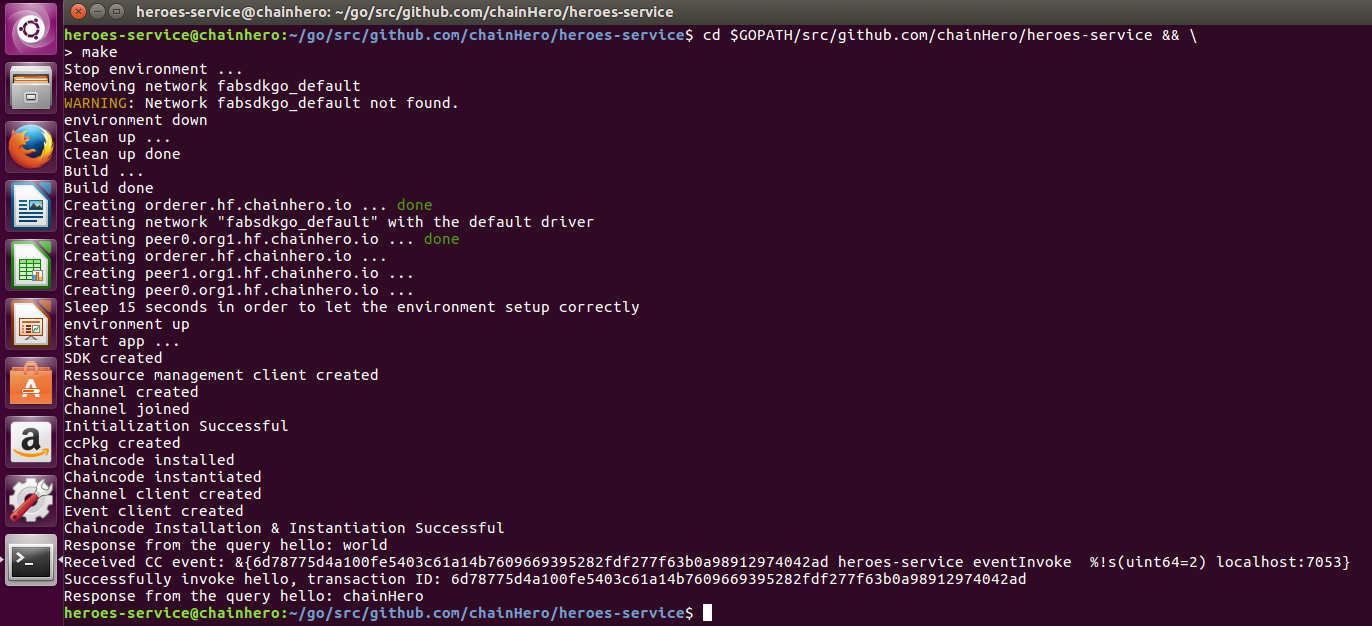
Note: this error message may appear: endorsement validation failed: Endorser Client Status Code: (3) ENDORSEMENT_MISMATCH. Description: ProposalResponsePayloads do not match. Since we have two peers, the SDK sends its request to the two directly and if it receives a different answer (which is quite possible because it’s an asynchronous system) then it returns this error. The best thing to do in these cases is to start over again.
6. Make this in a web application
We also can make this usable for any user. The best choice is a web application and we are lucky because the Go language natively provides a web server handling HTTP requests and also templating for HTML.
For now, we have only two different actions: the query and the invocation of the hello value. Let’s make two HTML pages for each action. We add a web directory with three other directories:
-
web/templates: contains all HTML pages (templates) -
web/assets: contains all CSS, Javascript, Fonts, Images… -
web/controllers: contains all functions that will render templates
We use the MVC (Model-View-Controller) to make it more readable. The Model will be the blockchain part, the View are templates and Controller are provided by functions in the controllers directory.
Populate each with the appropriate code (we also added Bootstrap to make the result a little prettier):
-
web/templates/layout.html -
web/templates/home.html -
web/templates/request.html -
web/controllers/controller.go -
web/controllers/home.go -
web/controllers/request.go -
web/app.go -
web/assets
And finally, we change the main.go, in order to use the web interface instead of directly query the blockchain.
Run the app and go to localhost:3000/home.html:
cd $GOPATH/src/github.com/chainHero/heroes-service ; \
make
The home page make a query in the blockchain to get the value of the hello key and display it.

The request page has a form to change the hello value.
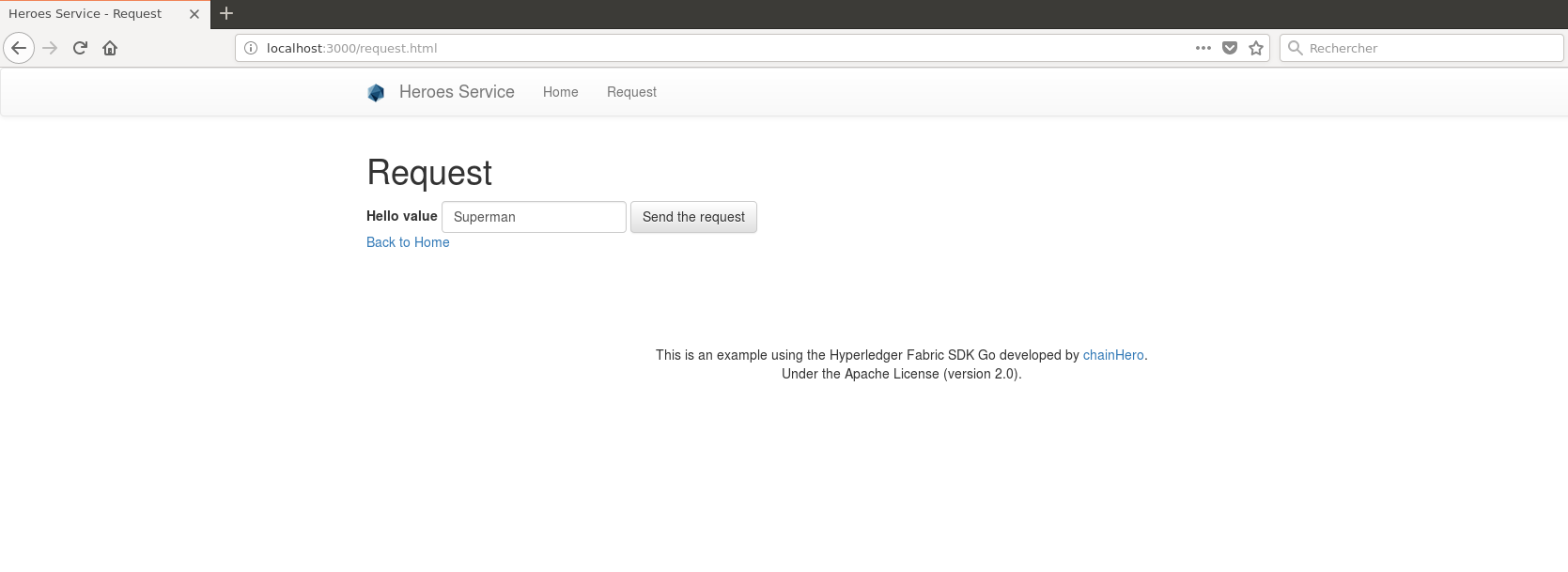
After a successful submission the transaction ID is given.
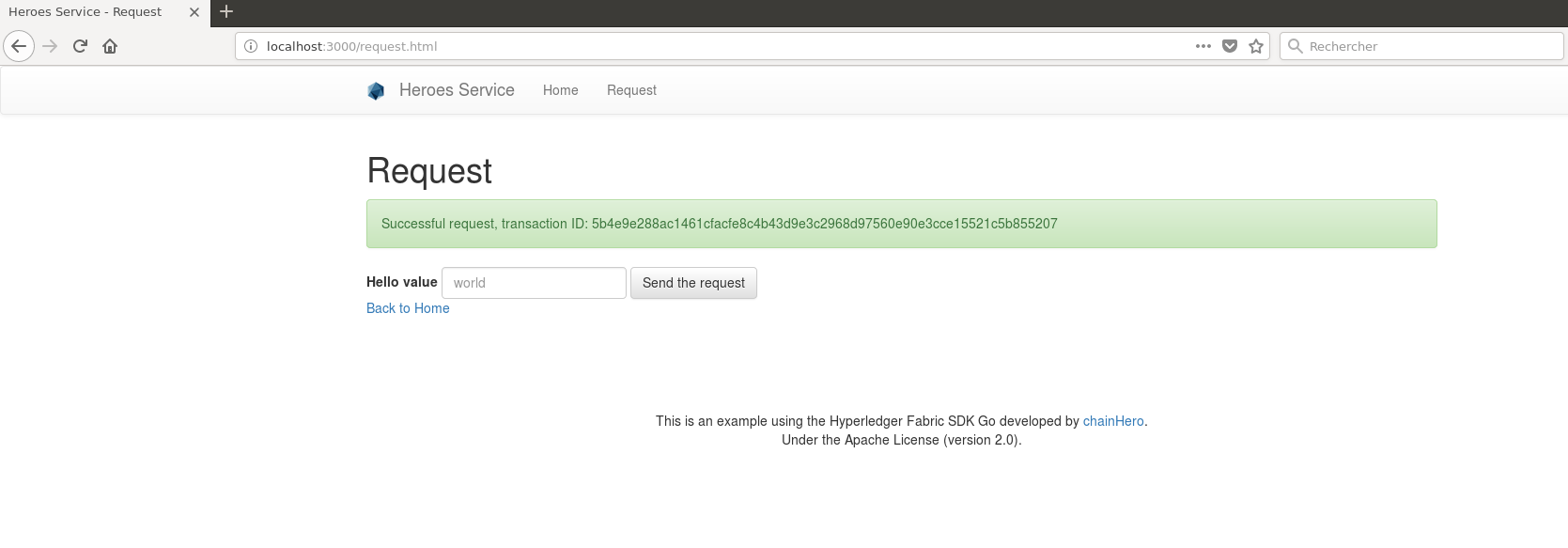
We can see the change by going back to the home page.
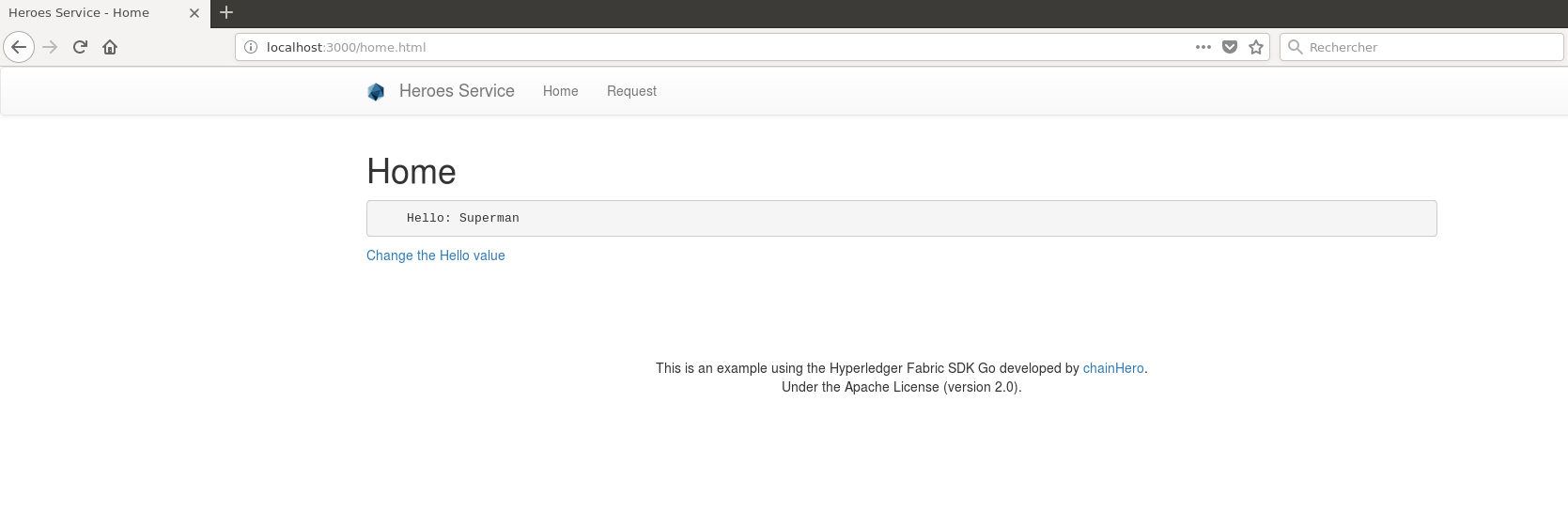
It’s the end for the first part. A more complex application is coming.
7. Referencies
- Hyperledger website
- Hyperledger Fabric online documentation
- Hyperledger Fabric on github
- Hyperledger Fabric Certificate Authority on github
- Hyperledger Fabric SDK Go on github
- Fabric SDK Go tests
- CLI: An example CLI for Fabric built with the Go SDK.

